I recently listened to a talk by Jamer Hunt on "The Anxious Space between Design and Ethnography" In his talk, he creates a two-dimensional space (four quadrants) to reflect the famous quote from Donald Rumsfeld on "Unknown-Unknowns." He uses this space to illustrate the overlapping territory explored by anthropology and design.
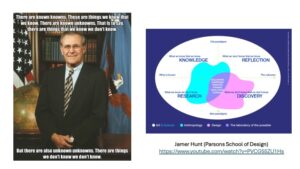
The talk stimulated me to think more generally about relations between basic laboratory research, field research, and design. I was trained in human experimental psychology in a way that emphasized experimental design and controlled laboratory research. This was motivated by a clear bias that doing controlled experiments was the way to do "real" science. However, I was also involved in the development of the aviation psychology laboratory at Ohio State University and was exposed to applied Engineering Psychology in the tradition of Paul Fitts. And much of my career has been focused toward applying cognitive psychology in applied domains such as aviation, driving, and healthcare.
In light of these experiences, I have come to see most laboratory research as situated in the domain of Known-Knowns. Much of the published experimental literature are demonstrations of what we already know. For example, consider all the replications of Fitts' Law or all the variations on visual and memory search or more recently the replications of 'blind sight' experiments. Laboratory research does sometime open up insights into and fill gaps in the Known-Unknown territory, but surprise is extremely rare!
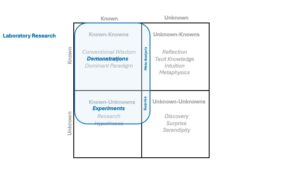
In my experience field research pushes us further into the region of Unknown-Unknowns - increasing the potential for surprise. Increasing the potential to learn something knew.
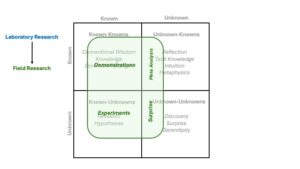
And design pushes us still further into the region of Unknown-Unknowns, increasing the potential for surprise - increasing the potential for learning and discovery. Also note that as we move deeper into the region of Unknown-Unknown, we also move deeper into the region of Unknown-Knowns. This is the region for reflection, meta-analysis, and metaphysics. As we move into the Unknown it becomes more important to reconsider and reflect on foundational assumptions and to build theory to connect the dots and integrate across empirical experiments.
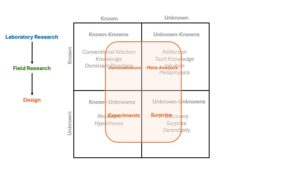
I have come to the conclusion that a mature science depends on a healthy coupling between laboratory research, field research, and design. I believe that the ultimate test of any hypothesis or theory is its ability to motivate solutions to practical problems. I believe that paradigm shifts emerge from the coupling of research and design.
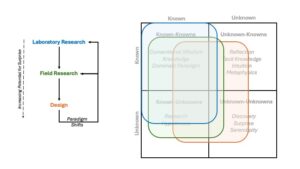
Certainly, experimental research serves a valuable function. However, if you are serious about learning and discovery, then it is important to explore beyond the laboratory, to get out of the territory of the known - to test your hypotheses and theories in practice, and to increase the potential for surprise.
